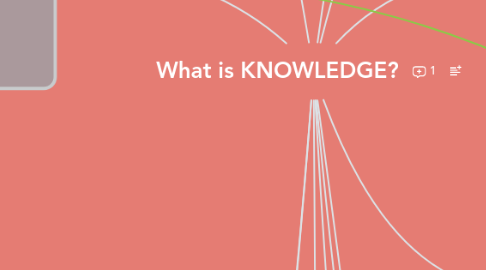What is KNOWLEDGE?
by Jennifer McDaniel


1. This difficulty regarding defining knowledge is known as the problem of the criterion, and it dates right back to antiquity. We can roughly summarise the problem in terms of the following two claims:
1.1. 1 I can only identify instances of knowledge provided I already know what the criteria for knowledge are.
1.2. 2 I can only know what the criteria for knowledge are provided I am already able to identify instances of knowledge.
2. It is gained through the senses.
2.1. It involves making sense of the world
2.2. It can be personal
2.3. It can be learned by compensatory means through a multiple of medium, and through a variety of types of senses
3. It involves forming neuro-connections
3.1. It builds new schema based upon each past idea
3.1.1. in turn, it creates a new perspective
3.2. It can be progressive and follows a developmental baseline
3.3. Some knowledge may be deemed innate (cell memory)
4. It can be gained / influenced by social constructs
4.1. It can be taught through the experiences of others, particularly sources of trust
4.1.1. It can be passed on through technology
4.1.1.1. It can be stored externally, and beyond human intellect (AI)
4.1.1.2. It's access can be inequitable for some
4.1.2. It can be altered and fluid
4.2. It can differ by culture
4.2.1. Common knowledge forms a sense of belonging
4.2.1.1. It can adversely create an us and them mentality and a sense of non-belonging
4.2.1.1.1. It can cause judgment, differing options, war, religion, cultural divergence...
4.3. Some forms are universal truths
4.3.1. global.collective knowledge
4.4. It can be lost and rediscovered
4.4.1. It can be gained authentically, and recalled when relevant
5. It involves metacognition and reflection
5.1. It is influenced within a personal state of consciousness and awareness and involves perspective
5.1.1. Different value is perceived regarding knowledge and reasoning
